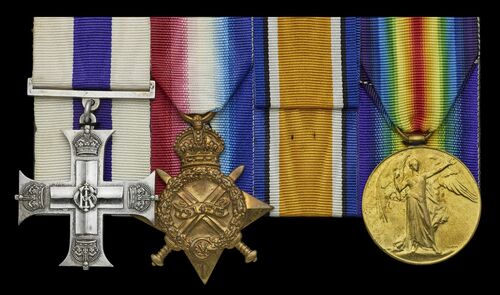
Auction: 24001 - Orders, Decorations and Medals
Lot: 172
‘A fine soldier and a born leader of men, who were always ready to follow him anywhere. Like everything else he took in hand, he put his heath and soul into his soldiering and proved a most capable and trustworthy officer, and one who would have gone far had he been spared. He was awarded the Military Cross for gallantry in the fighting at High Wood in July 1916. He took a zealous interest in the Church Lads’ Brigade, and was a keen athlete, being Captain of the Broughton Cricket Club and the North Manchester Association Football Club.’
(The testament of a comrade regarding Captain James Rockcliffe Smith M.C., 16th (Church Lads Brigade) Battalion, King's Royal Rifle Corps, after his death in 1917 in De Ruvigny's Roll of Honour)
A superb 'High Wood 1916' M.C. group of three awarded to Captain J. R. Smith, 16th (Church Lads Brigade) Battalion, King's Royal Rifle Corps, who was wounded early in the Battle of the Somme but survived only for his luck to run out while leading his Company against the Hindenburg Line on 20 May 1917
Military Cross, G.V.R., unnamed as issued; 1914-15 Star (Capt. J. R. Smith. K. R. Rif. C); Victory Medal 1914-1919 (Capt. J. R. Smith.), very fine (3)
M.C. London Gazette 1 January 1917.
James Rockcliffe Smith was born at Manchester in 1883, the son of Robert and Harriet Smith of Broughton, Lancashire. Educated at J. W. Leathley's School and later Higher Broughton School he joined the staff of the Commercial Union Assurance Company. An enthusiastic member of the Manchester Church Lads Brigade, an affiliation which would was to affect his wartime service considerably.
Commissioned 2nd Lieutenant on 24 September 1914 Smith joined the 16th (Church Lads Brigade) Battalion, King's Royal Rifle Corps. He was further advanced Lieutenant on 15 February 1915 and later Captain on 11 November before entering the war in France on 17 November. They spent the last months of that year behind the lines, going into the trenches for the first time at Givenchy on 2 January 1916.
They saw action on a large scale for the first time during the Somme Offensive, attacking around High Wood on 6 July 1916. The 19th Brigade was ordered to withdraw from the Wood on 21 July and the 16th Battalion moved up to cover their withdrawal. The companies hurried to form defensive positions but they had hardly begun when a strong German attack developed, spearheaded by bombing parties. The Battalion held on despite heavy losses and - by making good use of snipers and Lewis guns - drove the enemy off, earning the praise of Field Marshal Lord Grenfell:
'... desire to express their high appreciation of the good and gallant conduct of the 16th (C.L.B.) Battalion in the late attack on High Wood by the Battalion; at the same time they deeply deplore the loss of life and casualties among their devoted comrades on that day. Lord Grenfell has heard from high sources how splendid the behaviour of the Battalion has been...'
(The King's Royal Rifles Corps Chronicle, refers)
Smith was wounded at the high point of the German attack with his medical records noting a gunshot wound to the groin and another to the thigh, causing damage to his tibia. He was evacuated to England on 23 July 1916 but despite the severity of his wounds he was not gone long, returning to France just three months later in November.
The Battalion saw action at the Battle of Arras in the Spring of 1917 which fed into the advance against the Hindenburg Line in May. They went into the attack there before Croisilles on 20 May 1917, advancing against the German lines on the Fontaine-Croisilles Road. Smith was at the head of ‘D’ Company, forming the third wave of the attack, following up on the gains made by ‘C’ and ‘B’ companies in front.
The front lines fell after heavy fighting however the support trenches were strongly held and ‘D’ Company was halted before it. Again present at the high point of the attack Smith was killed in action here, the fourth wave which arrived in support was also driven off and the Battalion was forced to return to their start lines. His death was reported in the Uxbridge & W. Drayton Gazette on 6 July, which states:
‘Captain J. R. Smith, M.C. of the C.L.B. Battalion, K.R.R.C., killed in action, May 20th. He was late Adjutant, 1st Cadet Battalion, Manchester Regiment, C.L.B.’
He is commemorated upon the Arras Memorial; sold together with copied research including extracts from the London Gazette, The King's Royal Rifle Corps Chronicle and De Ruvigny's Roll of Honour, as well as application for commission, medical records, photographs of the Arras Memorial and census data.
Further entitled to the British War Medal 1914-20.
Subject to 20% VAT on Buyer’s Premium. For more information please view Terms and Conditions for Buyers.
Sold for
£650
Starting price
£600




